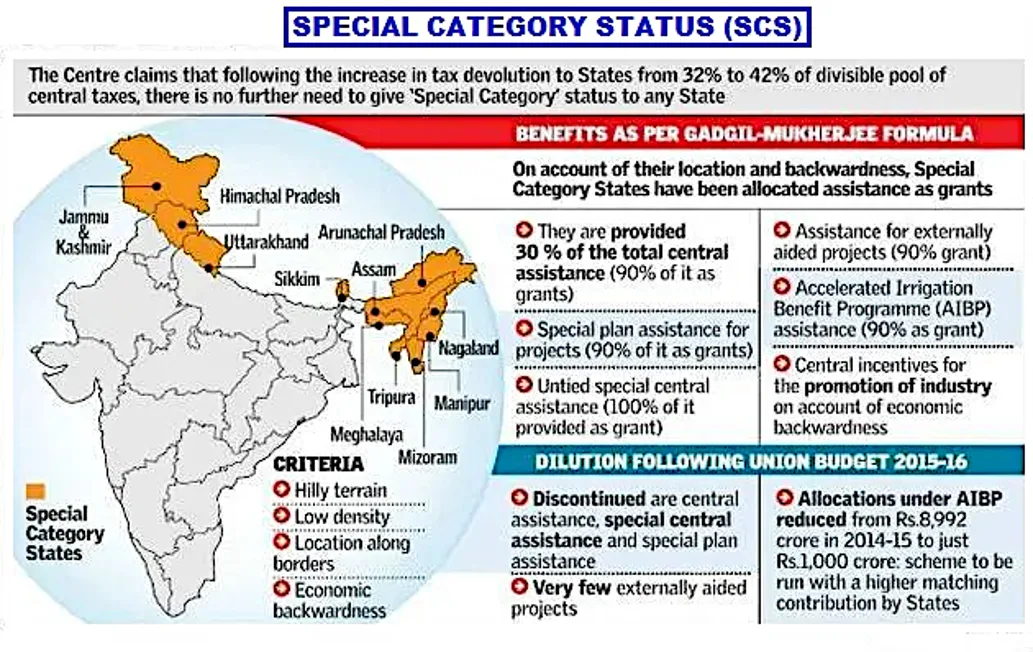
Why in the News?
- Bihar Chief Minister Nitish Kumar has reiterated the State’s long-standing demand to be granted the special category status by the Centre, a move that would increase the amount of tax revenues that the State gets from the Centre.
- The demand for special category status right now is significant because Prime Minister Narendra Modi’s Bharatiya Janata Party (BJP) depends on support from Mr. Kumar’s Janata Dal (United), which has 12 seats in the new Lok Sabha, to hold on to power at the Centre. Notably, the Bihar Cabinet had passed a resolution late last year demanding special category status to the State.
- The special category status was introduced in 1969 based on the recommendations of the Fifth Finance Commission.
- The intent was to help States that are disadvantaged in terms of their geographic, social or economic status to improve their position on par with other, more developed Indian States.
Why is Bihar advocating for Special Category Status (SCS)?
- Bihar faces significant economic challenges, such as a lack of industrial development and limited investment opportunities.
- The state’s division led to industries relocating to Jharkhand, worsening Bihar’s employment and economic growth issues.
- Natural disasters like floods in the north and severe droughts in the south disrupt agriculture, impacting irrigation and water supply, thus affecting livelihoods and economic stability.
- Bihar’s insufficient infrastructure, marked by poor roads, limited healthcare, and educational facilities, further hampers its development.
- The Raghuram Rajan Committee categorized Bihar as “least developed” in 2013.
- The state also grapples with high poverty rates, with a substantial portion of its population living below the poverty line.
- `According to a recent NITI Aayog survey, Bihar has the highest proportion of multidimensionally poor individuals in the country, far exceeding the national average.
- Bihar’s per-capita GDP of Rs. 60,000 in 2022-23 significantly trails the national average of Rs. 1,69,496, reflecting its lag in human development indicators.
- Seeking SCS is crucial for Bihar as it aims to secure substantial financial aid from the central government to tackle these persistent socio-economic challenges.
- The Bihar government estimates that obtaining SCS could result in an additional Rs. 2.5 lakh crore over five years, aimed at improving the welfare of its 94 lakh poor families.
Arguments Against Granting Special Category Status to Bihar
- However, some critics argue that providing increased funds could incentivize poor policies and penalize well-performing states, as resources would be diverted to economically weaker states.
- Historically, Bihar’s inadequate rule of law has significantly hindered its growth and attractiveness for investment.
- Following the recommendations of the 14th Finance Commission, the Centre already allocates 42% of taxes to states, up from 32%, which could strain national funds and impact other welfare schemes.
- Despite Bihar’s impressive economic growth—10.6% GDP growth in 2022-23, surpassing the national average of 7.2%—and a 9.4% increase in real per capita income, critics argue that more funds might provide short-term relief but could overshadow the need for long-term improvements in governance and the investment climate.
- While Bihar meets most criteria for Special Category Status, it falls short due to its lack of hilly terrain and geographically difficult areas, which are seen as crucial for infrastructural development challenges.
- Citing the 14th Finance Commission’s recommendation against granting Special Category Status to any state, the Central government has consistently refused Bihar’s requests.
Other States Demanding SCS
- Since its bifurcation in 2014, Andhra Pradesh has been asking for a grant of SCS on the grounds of revenue loss due to Hyderabad going to Telangana.
- Additionally, Odisha has also been requesting the SCS, highlighting its vulnerability to natural calamities such as cyclones and a large tribal population (nearly 22%).
What is a Special Category Status?
- About:
- The Special Category Status (SCS) is a designation provided by the Centre to support the development of states that encounter geographical and socio-economic challenges.
- The Constitution originally did not include provisions for SCS; this classification emerged based on recommendations from the 5th Finance Commission in 1969.
- Initially, Jammu and Kashmir, Assam, and Nagaland were granted this status in 1969, with Telangana being the most recent state to receive it.
- It’s important to distinguish SCS from Special Status, which confers greater legislative and political privileges. SCS primarily addresses economic and financial aspects.
- For example, Jammu and Kashmir previously held Special Status until Article 370 was revoked.
- Parameters (Based on Gadgil Formula):
- Hilly Terrain
- Low Population Density and/or Sizeable Share of Tribal Population
- Strategic Location along Borders with Neighbouring Countries
- Economic and Infrastructure Backwardness
- Nonviable Nature of State Finances
- Benefits:
- Special category status states receive 90% of the required funds from the Centre for Centrally-Sponsored Schemes, compared to 60% or 75% for other states, with the state governments contributing the rest.
- Unutilized funds in a fiscal year are rolled over and not forfeited.
- These states also benefit from considerable exemptions in excise and customs duties, income tax, and corporate tax.
- Special category states receive 30% of the Centre’s Gross Budget allocation.
- Challenges:
- Resource Allocation: Granting Special Category Status involves offering more financial aid to the state, potentially burdening the central government’s resources.
- Dependency on Central Assistance: States awarded Special Category Status often develop a significant reliance on central aid, which hampers initiatives aimed at self-reliance and pursuing independent economic growth strategies.
- Implementation Challenges: Despite receiving Special Category Status, challenges may persist in effectively utilizing allocated funds due to administrative inefficiencies, corruption, or inadequate planning.
Is Bihar’s Demand Justified?
- Criteria Fulfillment: Bihar meets most SCS criteria but lacks hilly terrain and geographically difficult areas, crucial for infrastructural development.
- Alternative Solutions: In 2013, the Raghuram Rajan Committee proposed a ‘multi-dimensional index’ methodology instead of SCS, which could be revisited to address Bihar’s socio-economic challenges effectively.
- Way Forward
- It is necessary to review and improve the standards for granting Special Category Status (SCS) to ensure equity and openness.
- The Raghuram Rajan Committee proposed a revised approach in 2013, advocating for a ‘multi-dimensional index’ to allocate funds instead of SCS, which could be reconsidered to tackle the socio-economic disadvantages of states.
- Adopt policies aimed at reducing states’ reliance on central aid by fostering self-reliance and economic variety.
- Encourage states to develop their own revenue sources.
- Experts recommend that Bihar should enhance its legal framework to support sustainable economic development.
- Additional measures are needed to encourage states to formulate comprehensive development plans, including:
- Education Reform: The RTE Forum’s recommendations emphasize enhancing early childhood development through ICDS centres, improving teacher training, and transitioning to more interactive and technology-driven teaching methods.
- Skill Development and Employment Generation: Bihar’s burgeoning youth population requires opportunities for skill development.
- Initiatives should concentrate on aligning skill training programs with emerging industries and fostering entrepreneurship. Programs such as the SIPB (Single-window Investment Promotion Board) can attract businesses, thereby creating employment opportunities.
- Infrastructure Enhancement: Enhancing infrastructure is pivotal for overall economic advancement. Priorities should include upgrading irrigation systems to mitigate floods and droughts, as well as developing a robust transportation network linking rural and urban areas.
- These improvements will attract investments and bolster agricultural trade.
- Women’s Empowerment and Social Inclusion: Bihar faces challenges related to gender equality and social stratification. Efforts should focus on enhancing women’s education, skill development, and financial inclusion.
- Additionally, addressing social disparities through rigorous law enforcement and promoting social cohesion are crucial steps.
Disclaimer: The article may contain information pertaining to prior academic years; for further information, visit the exam’s “official or concerned website“.
Explore our courses: https://apnipathshala.com/courses/
Explore Our test Series: https://tests.apnipathshala.com/








